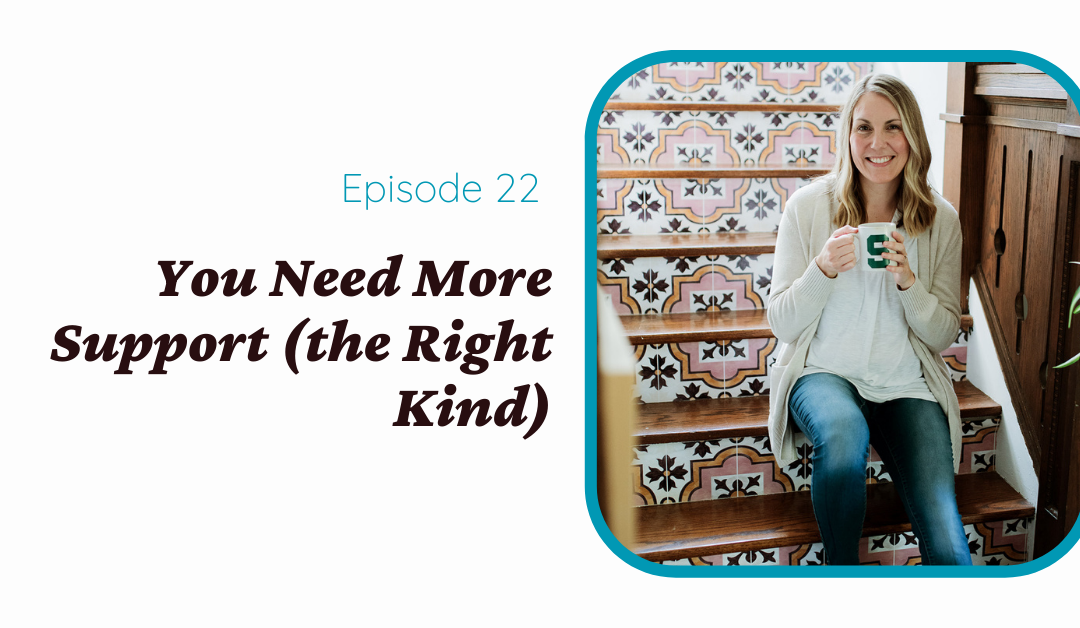Podcast: Play in new window | Download
Subscribe to The Innovative Therapist Podcast! Apple Podcasts | Spotify | RSS | More
Episode 22. In this episode I dive into the topic of support. We will cover why you more than likely need more support, what type of support you need, and how to go about getting that support. We will talk about how having people around versus truly utilizing your support system effectively is very different, and how to make shifts in this area that truly move you forward in a positive direction.
Want to start from the beginning? Check out the Foundational Episodes of the Motivation Made Podcast here!
- Introduction: What is this podcast all about?
- Episode 1: Want to Get & Stay Motivated? A Crash Course on Motivation, Weight Loss, and Health
- Episode 2: How Dieting Steals Our Motivation
- Episode 3: How To Get Motivated To Improve Your Health (Motivation 101)
- Episode 4: How to Transform Health Fears Into Forward Progress
Do You Have Enough Support?
At my previous job, I did pre-surgical psychological evaluations for people looking to have bariatric surgery, or weight loss surgery. I would ask every person about their support system, including asking about people they have for emotional support (e.g., someone they can talk to openly if they are sad, scared, ashamed, etc) as well as logistical support (e.g., who do you have that can help you out as you recover).
I would ask them the simple question, “Do you feel you have enough support?”
Most people would tell me that yes, in fact, they did. Or they might say, “I rely on myself only” or “I don’t need that much support.”
Other times, they would say they had enough support, but perhaps later if I saw them for another visit, they might admit: “Well, I have people who care about me, but I rarely tell them how I’m truly doing.” Or on the flip side, they would share that in fact while they had people in their life that expressed caring for them, these people would also make very food policing and weight biased comments that would ultimately lead the person down a trajectory of body shame.
Shame and Fear of Rejection
Fears of not belonging, fears of failure, and being rejected by others, is a universal struggle. If you have this struggle, it has nothing to do with something being “wrong” with you, and everything to do with you being a human being.

If I had a dollar for every time I heard, “They wont get it,” or “I don’t want to bother anyone,” or “I don’t want to be a burden” or “be too negative”, I’d be a rich woman.
Here’s the thing. When people come to you with pressure that you need to fix their shame, yes it can be a burden. OR, when you endlessly complain about surface level things, or tell someone over and over that you are stressed about hating your body, or various surface level worries or anxieties that actually aren’t what’s truly bothering you, it can be ineffective and over time can become draining.
But that isn’t really what you need support for, and it isn’t really what it’s about. Underneath all the diet and calorie obsession, or the random worry about minute details, or your unhealthy relationship patterns or other symptom level stuff, is your underlying stuff. Your human being core stuff that we ALL HAVE. Fears of failure. Fears of discomfort and your “negative emotions,” fears of not belonging, and your self-doubt.
That’s what you need support for. And that’s where you relate to other humans. When you share that stuff with the right people who are emotionally mature enough to realize that they don’t need to fix it, and that just empathy and understanding is all you need, that’s where the magic happens, where you feel supported, and when you can truly start to move through your stuff and thrive.
Wanna Take a Walk with Me?
Have you taken a walk with me yet? Maybe you listen to this podcast on a walk but how about listening to a guided audio all about shifting your motivation from external diet mentality to internal empowered changes and respecting your body. Download my free 10 minute audio, pop your ear buds in, and take a walk with yours truly today!
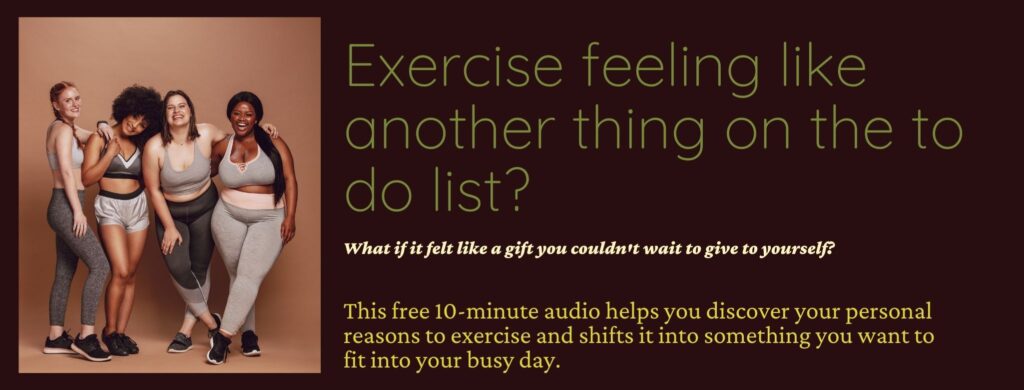
Why Does Support Matter So Darn Much?
Let’s go back to our motivation types, shall we? Remember how we ideally want to shift and move towards internal motivation, towards the types called identified, integrated and intrinsic. These types mean that you are doing the behavior (lets use exercise as the example) because you personally value it, it’s congruent with your identity, and/or you enjoy it or get satisfaction from it (e.g., it’s fun, exciting, challenging, interesting, etc).
Unfortunately, it isn’t usually as simple as just saying to yourself “Ok, I’m going to start exercising to take great care of myself now instead of using it as a punishment and a way to burn calories.” It usually takes time to remove the layers of guilt and shame that are so often tied up with eating and exercise behaviors in particularly, so that we can learn to enjoy them or at least learn to feel competent we can do them consistently.
It takes time to identify how you actually want to feel, see that it’s possible by surrounding yourself with people who are taking a similar approach, and gradually shifting that way yourself with time and practice.
In community support you can celebrate small wins, express frustrations and emotions that are coming up and achieve a sense of belonging as you work towards your goals, whether that is relationship with food, or otherwise.
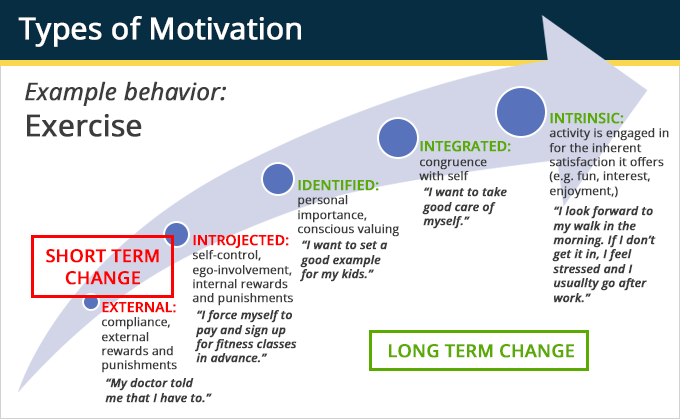
So How Do We Make Healthy Habits More Internally Motivated?
There are three key psychological needs that facilitate long-term habit change, and essential thriving human beings. Those needs are:
- Autonomy: Freedom from excessive pressure to behavior in a certain way, “I have choice.”
- Competence: Feeling that you can accomplish what you set out to do, feeling effective, “I got this.”
- Relatedness: The need to feel that one belongs and is connected with others, “I belong here”
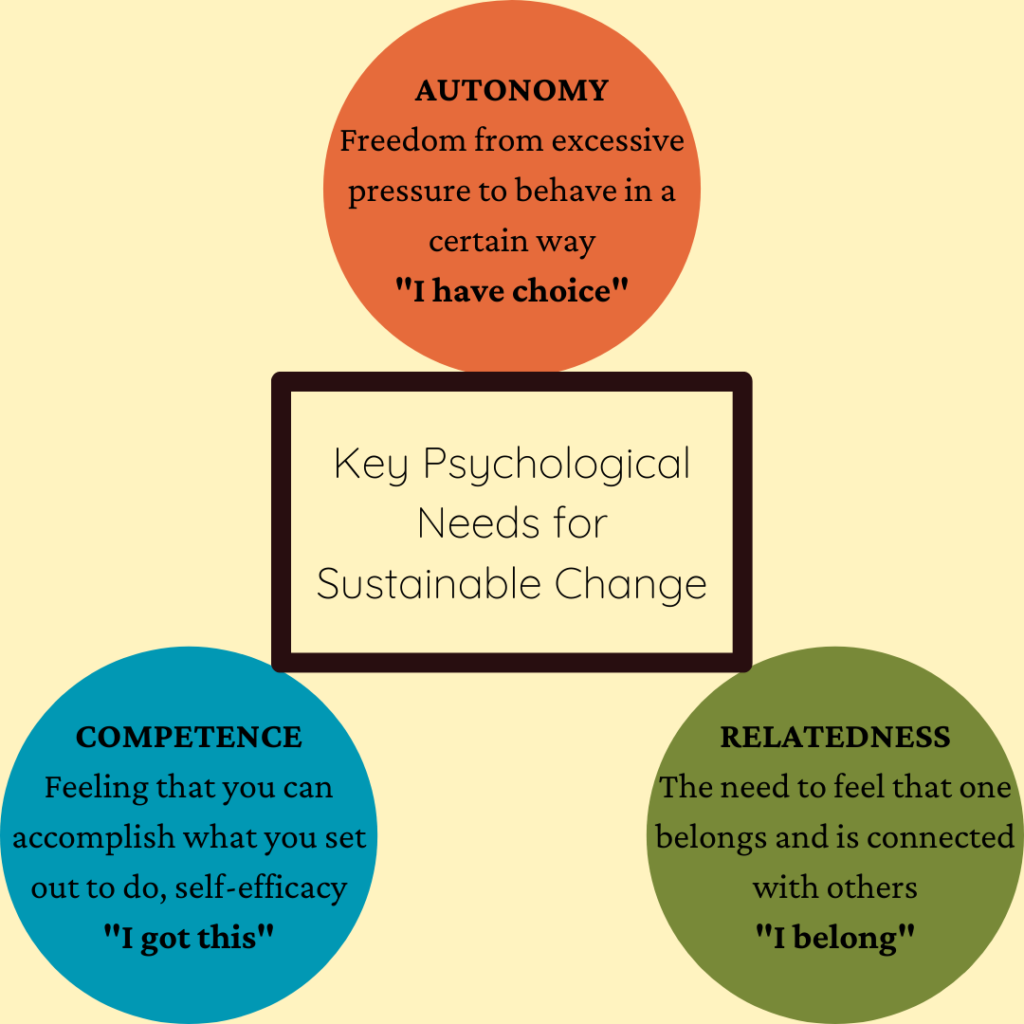
When we feel seen and valued for who we truly are, that’s when the magic “motivation” happens. We start to realize, yeah we have stuff we are ashamed of, and we have fears and self-doubts and fears of rejection and failure, because that’s part of the human experience.
There isn’t anything wrong with us, we can accept and appreciate ourselves for who we are. From there, we can pursue any and all goals and dreams in a way more effective place, because we realize we are enough just as we are, AND we can continue to strive towards what matters to us.
Example: How to Learn Intuitive Eating
Intuitive eating and mindful eating as I’ve talked about again and again, can be an excellent way to move away from shoulds and towards figuring out a way of eating that is non-restrictive and feels good for you and your body.
It is a process and there isn’t a step by step guide that fits for every human. That’s why have a group of people working towards the similar goal is so helpful. In my Body Respect Program, or any other other community, you can work towards learning new ways of relating to yourself, unlearning things, seeing others succeed and seeing their struggle. The constant reminder that you are not alone, helps you continue along the path to more feelings of effectiveness and empowerment.
How To Guide to Get More of the Right Support
There are many different types of support, and in many ways, it’s never been easier to curate a support system thanks to the internet. So lets dive into some practical steps you can take now to move towards garnering a more robust support network and moving more quickly towards your most important goals.
- Improve Connection with Existing Supports. All of us have people in our lives that care for us but we aren’t feeling fully supported by. Often, this is because we have not clearly communicated our needs in a calm, assertive manner. Assertive communication is a skill that can be learned and improved. It is not confrontation or aggression. It is communicating our needs clearly, respecting ourselves AND respecting the other person. It can be as simple as, “I really would like help with cleaning the house,” to “When you make comments about what I eat, I feel even worse about myself. It would be most helpful if you could not say anything.” It may also be related to emotional support, such as “when I’m sad, I really need you to just give me a hug or listen, please don’t try to fix it.” It’s useful to give the person the benefit of the doubt here by saying something like, “I know you didn’t mean to hurt me,” or “I never told you this was unhelpful until now, so you wouldn’t have known. Now you do.” It is NOT blaming them, just stating facts and telling them clearly what they can do to help you out.
- Set Clear Boundaries with Support that Drains You. If you have clearly communicated your needs and the person is not willing and/or capable of change, it’s time to set some boundaries. Sometimes, that means ending a relationship or spending less time with someone. Other times, it means saying “when you make comments like that, I’m going to leave the room or hang up the phone.” Then you must follow through. Try to do so calmly, but it’s also important that if you choose to remain in a relationship with someone who hurts you, you need a plan to cope effectively with your emotions after the hurtful experience. If you have a mom who continues to talk about your weight, you might choose to call her on a schedule, and calmly tell you you are hanging up if she makes those types of comments. Then after the call, make sure you journal, talk a walk, or call a friend to move through the emotions that the call brought up for you (e.g., anger, sadness, loss) so that you are not victim to the continued stress.
- Build New Connections. It’s never been easier to find people you connect with. The internet and social media is a very unhelpful place in many ways, and yet, there’s a lot of good there. Between Facebook and Facebook groups, Instagram, Tik Tok (I don’t do this one yet), and many more, there are endless options. Meetup.com is a site where you can find local meet up groups from anything to Spanish club, to creating gowns for NICU babies, to local hikes (I literally just googled that and all 3 of those are currently available in my area). If you have a lot of negative supports in your life, a lot of people with BS diet culture and body shaming and food police comments, I need you to find more support for yourself please. You may need even more of a buffer to counteract all the BS in your life. But there are lots of people out there, you just have to find the ones you connect with, and the support you can provide one another can be life changing.
Of course, finally, finding a therapist or a coach, ideally one who gets the importance of not being too weight-centric and realizing that you and your health are way more than your weight. I think therapy is wonderful, I’ve done it before and I will do it again. Therapy practices are really full right now, but it’s worth it, keep trying to find someone, get on waitlists. AND please please keep reaching out for other support beyond therapy. You may struggle with various degree of psychological symptoms, you might meet criteria for a disorder, you may meet for an “unspecified disorder” or “adjustment disorder.” It doesn’t really matter, we all need support beyond a therapist. We can relate to people in our lives who have different struggles. Because at the base of the tree, we are all the darn same.
I hope you found this helpful and I hope you will take at least one step towards increasing your support system immediately. Once you do, send me a DM on Instagram or tag me @psychology.of.wellness and let others know about this episode and how you are planning to seek additional connection and support in your life so that you can thrive, feel good, and move towards your most important goals and dreams.
Don’t Forget Your Freebie!
Grab my free 10 minute fun evidence-based guided audio now to get a boost of support from me talking over music!
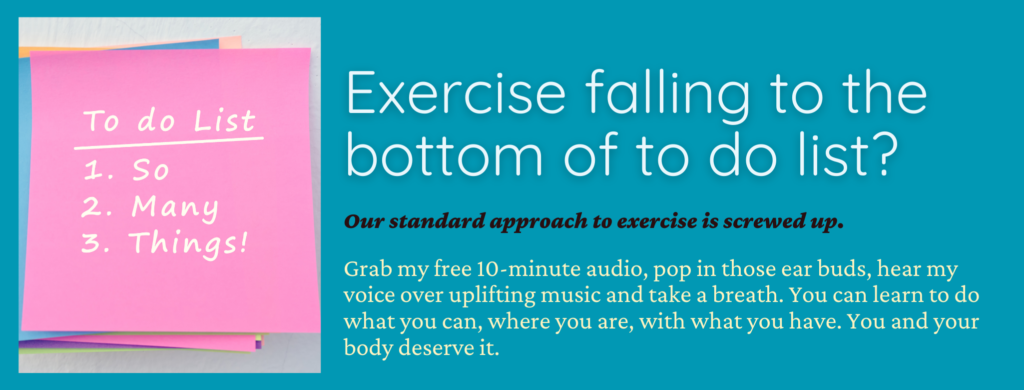
Disclaimer: This blog and podcast is for informational and educational purposes only. It is not a substitute for individual professional advice or treatment, including medical or mental health advice. It does not constitute a provider patient relationship.
